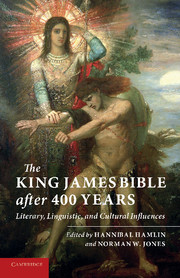Book contents
- Frontmatter
- Contents
- List of Figures
- List of Illustrations
- List of Contributors
- Acknowledgments
- Introduction
- Part I The Language of the King James Bible
- 1 Language within language
- 2 The glories and the glitches of the King James Bible
- Part II The History of the King James Bible
- Part III Literature and the King James Bible
- Chronology of major English Bible translations to 1957
- Chronology of English Bible translations since 1957
- Select bibliography on the King James Bible
- Index of Bible quotations
- General index
2 - The glories and the glitches of the King James Bible
Ecclesiastes as test-case
Published online by Cambridge University Press: 05 May 2014
- Frontmatter
- Contents
- List of Figures
- List of Illustrations
- List of Contributors
- Acknowledgments
- Introduction
- Part I The Language of the King James Bible
- 1 Language within language
- 2 The glories and the glitches of the King James Bible
- Part II The History of the King James Bible
- Part III Literature and the King James Bible
- Chronology of major English Bible translations to 1957
- Chronology of English Bible translations since 1957
- Select bibliography on the King James Bible
- Index of Bible quotations
- General index
Summary
Four centuries on, the King James Bible (KJB) still stands as one of the towering achievements of style in the English language. Subsequent translations of the Bible have only highlighted the grandeur of the 1611 version. The Revised Standard Version in its various recensions, though relatively more correct and less archaic, is a flattening and dilution of the seventeenth-century translation. The sundry English versions done by the scholarly-ecclesiastical committees of the different denominations in the second half of the twentieth century are for the most part stylistically inept and often embarrassing in their mixture of disparate linguistic registers and in their misguided efforts to make the syntax and diction of the ancient texts sound up-to-date. The power of the KJB is vividly registered in the multiple ways it has affected the shape of literary English from the seventeenth century to the present – in England, early on, in George Herbert, Bunyon, Blake, and others; in America, where the legacy of the KJB eventually became more pervasive, in the poetry of Emily Dickinson and Whitman, in the prose style of Melville, Hemingway, Faulkner, and all the way to Marilynne Robinson and Cormac McCarthy in the present literary moment.
- Type
- Chapter
- Information
- The King James Bible after Four Hundred YearsLiterary, Linguistic, and Cultural Influences, pp. 45 - 58Publisher: Cambridge University PressPrint publication year: 2010



